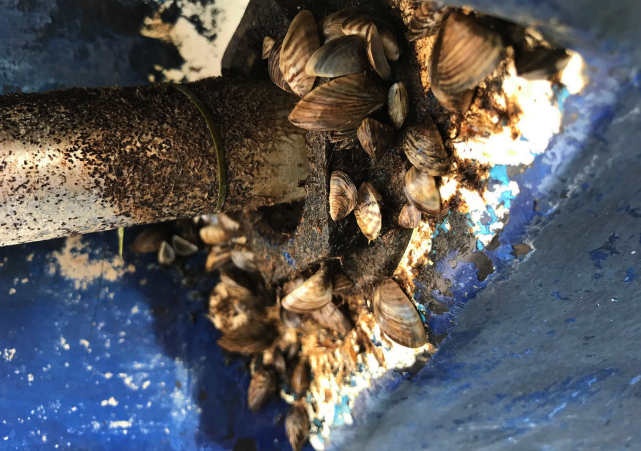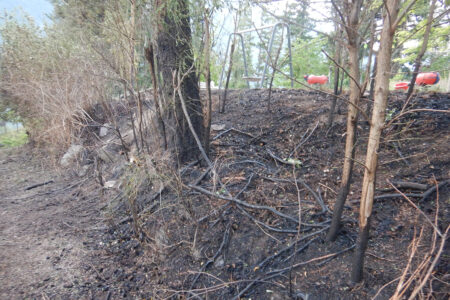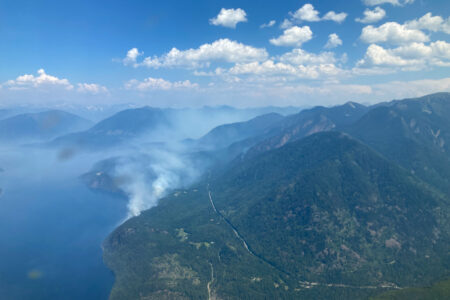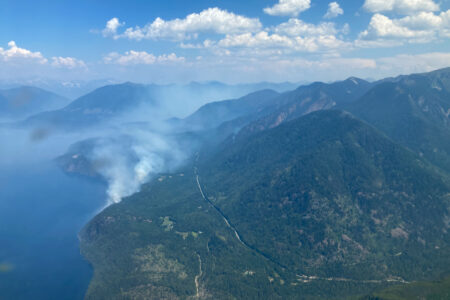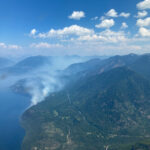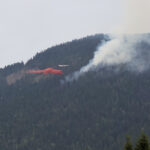B.C. under threat from invasive mussels and freshwater parasites — B.C. Wildlife Federation
British Columbia’s fish populations and freshwater ecosystems are facing threats from a parasite that causes whirling disease in trout and salmon and two species of invasive mussels.
The B.C. Wildlife Federation is deeply concerned that Fisheries and Oceans Canada (DFO), FortisBC and BC Hydro are scaling back their support for invasive mussel surveillance in B.C. and failing in their duty to protect our fish.
Zebra and Quagga mussels are responsible for hundreds of millions of dollars in damage in the United State and Eastern Canada. They attach themselves to boats, motors, trailers and marine equipment. They reproduce very quickly and are nearly impossible to eradicate once established. Zebra and Quagga mussel infestations can clog pipes, municipal water intake gear, and hydropower equipment.
Surveillance programs that monitor incoming watercraft and gear are the most effective means of preventing them from entering freshwater systems.
B.C. inspectors ordered 51 vessels decontaminated and 28 quarantined last summer alone. Source: 2023_imdp_summer_status_report_final.pdf (gov.bc.ca)
The provincial government considers them a threat to all of B.C.’s freshwater ecosystems. Infestations are predicted to lead to declines in lake trout, rainbow trout and kokanee salmon.
These mussels are frequently detected on boats coming to British Columbia from the United States.
A new threat
The microscopic parasite that causes whirling disease can survive for months in its early life stages, raising the risk that it could be transferred between bodies of water.
Last October, the federal government closed several lakes in Kootenay and Yoho National Parks and Emerald River until at least March 31, 2024, after several suspected cases of whirling disease were discovered in the Kicking Horse River, Wapta Lake, Monarch Creek and the confluence of the Emerald and Kicking Horse Rivers. Source: Whirling Disease – Province of British Columbia (gov.bc.ca)
The parasite has recently been detected in the headwaters of the Columbia River, which runs through the Kootenays, the southern Interior, Washington State, and Oregon.
“States where this parasite becomes established have seen losses as high as 90 per cent in trout and salmon populations,” said BCWF Executive Director Jesse Zeman. “We need to create a screening and public education program to stop the spread of these invasive parasites in British Columbia.”
Whirling disease is a federally reportable disease, under the supervision of the Canadian Food Inspection Agency.
“We need the federal government to step up now with increased surveillance before the effects become catastrophic,” said Zeman. “Every entry point in B.C. needs a mandatory 24-hour boat inspection station to stop these species from spreading north from the United States and west from Alberta.”
Lack of support
DFO has reduced its support for mussel surveillance from $475,000 in 2022 to zero in 2023. BC Hydro’s support for the program has dropped steadily since 2020, from $1.25 million to just $350,000. Support from FortisBC has dropped from $250,000 in 2020 to zero in 2023.
“We have had dozens of close calls in B.C. in the past few years with mussel-infested boats crossing the border,” said Zeman. “These mussels are the biggest threat known to our freshwater ecosystems; an infestation would be disastrous. Between whirling disease and invasive mussels we could realize the collapse of a number of our fisheries. From ensuring securing borders, to conserving our treasured fish stocks, the lack of leadership from the Government of Canada on this issue is astounding.”
The BCWF has sent a letter to the federal ministers responsible, FortisBC, and BC Hydro to express our disappointment with their invasive mussels screening policy and point out their responsibilities to British Columbians and the environment.
According to a May 2023 report to the provincial government, most of B.C.’s infrastructure, equipment, and activities for sectors that are vulnerable to Zebra and Quagga mussels are located in waterbodies at moderate to high-risk of ZQM invasion, including:
- 60% of hydro facilities representing
- 80% of hydro-generation capacity
- 93% of irrigation infrastructure
- 63% of municipal treatment facilities
- 89% of self-supplied domestic water systems; and
- 85% of the recreational fish catch.
Updated annual cost estimates range from $64 to $129 million including:
- $33.7 to $92.5 million in mitigation costs for water-related infrastructure; including $17.1 – $23.3 million for hydro infrastructure; $8.0 – $49.7 million for water supply infrastructure for municipal, domestic and aquaculture; and $2.5 – $5.3 million for agricultural irrigation and golf courses
- $3.7 – $8.1 million in additional annual maintenance to boats and marinas
- $2.5 – $12.6 million in lost profits and provincial revenues from losses in water-based non-resident tourism; and
- $30.2 million annualized loss in residential property values and property taxes due to reduced water quality and lost shoreline amenity values.
About the B.C. Wildlife Federation:
The B.C. Wildlife Federation is British Columbia’s leading conservation organization. As a province-wide member-driven charitable organization, with over 43,000 members and more than 100 member clubs, our organization represents the interests of all British Columbians who aim to protect, enhance and promote the wise use of the environment for the benefit of present and future generations.


